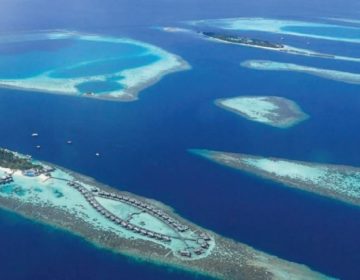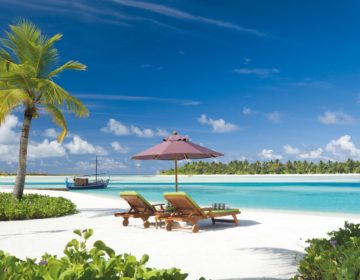The spectacular natural beauty of the Maldives’ palm-fringed tropical islands continues beneath the surface of the ocean with pristine reefs teeming with vibrant corals, brightly colored fish, and a myriad of other marine life, making it one of the best places in the world for scuba diving.
Home to 26 atolls, which span over 500 nautical miles from Haa Alifu in the North to the Addu Atoll in the South, the Maldives packs a punch when it comes to idyllic islands, however, the amount of land that lies above sea level in the Maldives represents only a tiny fraction of the country’s overall land mass, most of which lies below sea level. The nearly 1,200 islands of the Maldives are just the visible coral tips of an extensive oceanic volcanic mountain range whose outer edges can sometimes plunge to depths of almost 10,000 feet.
The relative isolation of the Maldives in the Indian Ocean has led to an extraordinary and diverse variety of marine species that call it home. Strong seasonal oceanic currents flowing through the country’s many islands have forged deep channels from the open ocean into the atolls. These channels direct plankton-rich waters into and out of the atolls, which in turn support an incredibly vibrant marine ecosystem. Inside the atoll, reefs, sandbars, islands, and lagoons have evolved over millennia to create nurseries and habitats for many of the reef’s inhabitants.

Diving Facilities
Every resort caters for scuba divers, and all types of international certifications are accepted. Divers should bring their logbooks and C-cards and be prepared to do a check-out dive. The cost of a dive includes an experienced guide, the dive, tanks, and weights. Boat costs are usually extra, depending on the distance and all diving boats are required to have a radio, life jackets, flag, oxygen, and medical kit.
Most divers bring their own equipment, but regulators, BCDs, computers, masks, snorkels, and fins are usually available for hire. International and DIN fittings are optional at any resorts. Safety balloons are an essential safety accessory that is not always available at diving schools and should be brought from home.
For those learning to dive, all resorts conduct open water and advanced courses. Many resorts cater for specialty courses, and in response to a growing interest in the marine environment, courses such as underwater naturalist and shark specialist have proved most popular. Library and education facilities are becoming more available, and dive centers regularly entertain divers with slide and video night presentations.
Diving Prices
The cost of dive courses varies with individual resorts. Single dives are offered, but diving packages with or without equipment for 10 or more dives are available and give better value for money. Divers should be aware that ‘non-limit’ diving packages in the Maldives, whether at a resort or on a safari boat, usually includes two dives per day, plus one or two night dives in the course of the package. This is not always the case, and divers are advised to check packages and prices with tour operators.
When to Dive
At resorts, diving is conducted daily all year round and the number of days when diving has to be canceled is few. During times of strong winds and rough seas, most resorts have a nearby site with protection on the lee side of the reef and only when storms, strong winds, and currents affect visibility and diver safety, will diving be canceled.
The high season is from December to April with the Christmas – New Year period from mid-December to early January, and Easter is the most popular. At this time resorts can be fully booked, or overbooked, and prices are higher. In August, the European holidays being another short ‘high’ season to resorts. Some of the best diving and greatest value can be had during the low season months between May and November. Smaller crowds, lower prices, and top diving regardless of the weather are some of the rewards for diving in off-peak periods.
Diving Safaris – What You Need to Know
Diving safaris are mostly operated between September and April, but some operators continue all year round. The calmest conditions are most likely to be in January, February, March, and April, but there are no guarantees with the weather and safaris in September and October can result in equally favorable conditions.
There are many boat owners in the Maldives offering their dhonis for commercial use. Only registered boat owners should be used as they required to obtain the necessary inter-atoll permits and to meet safety and health standards. Most safari diving operators rent or lease a boat from a registered owner and advertise for their clients abroad.
Up-market vessels have air-conditioning, desalination plants, videos, and computers. Some of the larger boats are permitted to have bar facilities.
 Image Courtesy of Manthiri Liveaboard
Image Courtesy of Manthiri Liveaboard
Some safari boats are traditional dhonis not designed for the diving market. They have limited fresh water, have a separate generator for night time use, are noisy, have limited deck and storage space and are often crowded. Each boat has its own standards in general cleanliness, and it is often advisable to check if boats have holding tanks for wastewater and sewerage. Once these factors are taken into account, divers can expect to get what they pay for.
To have a successful diving safari, there are some questions divers should ask their tour operator. Specific questions such as the capacity of the boat and the number of clients on board, the fresh water capacity for showering and washing equipment , such as cameras, the location of the generator (if it is in the engine room then it is likely to be less noisy) and if there is a backup generator. Also, ask about battery charging facilities; electricity supply from generators is generally from 220V TO 240V, 50Hz AC using round or square three-point plugs but divers may need their own adaptors. Contact tour operators for availability, prices, and services as conditions and rates of boats vary considerably.
Diving Dhonis
Most safari boats are suitable for diving only because they use a separate diving dhoni – a smaller open boat that carries all diving equipment, compressor, and tanks – that accompanies the mother boat during the cruise. This makes the journey more comfortable with less handling of equipment. The diving dhoni usually slower and make an early start to meet at pre-arranged dive sites in time. The drawback of this system is that bare minimum of only two dives a day is possible if traveling long distances. It is, therefore, useful to inquire about diving services on board. Firstly, does the diving package include a diving dhoni? Is there ‘unlimited diving’ and does this mean more than two days a day? Are there any night dives? Also, check if there is a backup compressor available if the tanks used are 15 liters or 12 liters and the type of fittings, and if there is additional equipment, oxygen and first aids aboard, and so on.
Divers should also enquire about the itinerary of the cruise. Many boats try to cover great distances over short periods of time and dive only at renowned sites. Some divers may prefer to limit the distance, for instance in a seven-day safari, to a small area and spend more time in the water diving and snorkeling than traveling between the atolls.
The type of diving varies considerably, and divers should ask what kind of diving the guide will be conducting and if it is suitable for their needs. For instance, long channel drift dives, Thila diving in a current, or deeper dives may be ideal for many, but not, say, for a group of photographers who only wish for a quiet reef with no current and plenty of opportunity to spend time in the water for their favorite hobby. Diving guides are generally flexible and cater for the taste of the majority.
 Image Courtesy of Pinterest
Image Courtesy of Pinterest
What to Bring
Some essential items include sun cream, hat, sunglasses, light clothing, a light waterproof jacket for the wet season, underwater torch, spare batteries, and cameras. A pair of binoculars, a compass, and a good map are useful additions, especially if on a safari boat.
Local Customs
When visiting inhabited islands, travelers should be aware that neat, conservative dress is required. Women should wear dresses below the knees or shorts that cover the thighs and not low-cut tops and tank-tops. Men should not go bare-chested. Nudity is prohibited, but brief bathers and bikinis are acceptable at resorts.
Visas
Visitors do not require a visa to visit the Maldives. A 30-day visitor’s permit is automatically given on arrival. Visitors are expected to leave the country before the 30-day permit expires or extend their visa by applying for an extension from the Immigration Office in the Huravee Building in Malé.
Travel Permits
Travel permits are required for anyone traveling outside the tourist zone. For divers on a safari trip through the atolls, registered safari operators will obtain the necessary permits before starting. If visiting an inhabited island while on a safari trip, it is a good idea to present yourself at the island office. Most islanders are incredibly hospitable, but they are more likely to welcome travelers if they are polite and respect local formalities and customs.
Electricity
Electricity supply is based on the English system from 220V to 240V, 50Hz AC using round or square three-point plugs. Most resorts have multi-use sockets that accept a variety of pin configurations for razors and battery chargers. On safari boats, it is a good idea to bring your own multi-socket adaptor for charging batteries, but most boats now cater to all divers electrical needs.
Health Insurance
Health insurance is strongly recommended for divers traveling to the Maldives. Some policies do not cover scuba diving, so ensure your policy covers the cost of hyper-baric treatment, air ambulances, seaplane transfers, and an emergency flight home. The Divers Alert Network (DAN) offers diving accident insurance and worldwide medical evacuation assistance. All decompression cases will be treated, however, payment for treatment will be required if insurance cover is not issued.
Decompression Chambers and Medical Care
Chambers are located on some islands, including Bandos, Kuramathi, and Kuredu Resorts. The center on Bandos Island Resort caters for divers in the Malé region, and the Kuramathi Medical Center on Kuramathi Tourist Resort in Rasdhoo provides for divers in the Ari Atoll region. The centers are well-equipped to European standards with trained hyperbaric specialists and nurses on call 24 hours a day.
The Bandos and Kuramathi chambers have space for four people in the main section. One person can be brought into the chamber lying on a unique, comfortable bed, built to treated paralyzed patients, allowing them to be turned during treatment. Additional services are also offered, and diving medical questions and fitness-to-dive issues are answered through a special telephone hotline. Diving physicians are directly accessible through a mobile phone.
In addition, the centers have beds for in-patients and are equipped with X-ray capability and minor surgery. For rescue operations, a portable respirator, ECG/defibrillator, and other necessary medical equipment are available, such as sleds and stretchers. Patients can be brought to the centers by speedboat or seaplane.
 Image Courtesy of Manthiri Liveaboard
Image Courtesy of Manthiri Liveaboard
Diver’s Medical Check
Before starting any open-water diving course or diving activity, prospective divers are required to fill in and sign a medical statement form. If further examination of conditions is required and the resort does not have a trained diving doctor, then divers can get a full medical check-up in Malé at the AMDC Clinic, the ADK Hospital, or at the Bandos and Kuramathi Medical Centers. It is advisable for prospective divers to obtain a diving medical certificate before leaving home.
Basic Health
Compared to many other Asian countries, the Maldives is remarkably free of health problems. Resorts are clean, and standards of cleanliness are high. In Malé, conditions of sanitation, especially in Tea Shops, has improved significantly in the past few years. Most resorts and many inhabited islands, including Malé, use desalinated water for washing and drinking. The water is good and unlikely to cause stomach upsets, but most resorts sell bottled water to clients. Vaccinations against tetanus, diphtheria, polio, and Hepatitis A are recommended, although not legally required, and vaccinations for yellow fever if coming from an infected area are required by law.
 Image Courtesy of Constance Hotels and Resorts
Image Courtesy of Constance Hotels and Resorts
Health tips
Drink plenty of water and acclimatize to high temperatures to avoid heat exhaustion. Wear loose clothing and a hat and use sunblock to prevent sunburn.
Coral cuts and grazes often become inflamed and infected because of foreign material such as pieces of coral, nematocysts, and slime. Carry antiseptic or medicated soap to wash and clean the wound and antibiotic powder or ointment for dressing.
Use ‘Aqua Ear’ or any other ear wash after every dive to prevent ‘tropical ear.’ This occurs when the function of the external ear canal has been affected by the removal of the cerumen from the ear, or by divers being immersed for long periods in warm tropical waters. Avoid scratching or using cotton buds to clean the ear.
For severe injuries from stonefish, stingrays, or cone shells, bathe the area in hot water and seek medical attention immediately.
When diving continuously over a period of days, do a couple of shallow dives before leaving and allow 24 hours before flying.




[…] Helengeli and Meerunfenfushi – a distance of 20km – a sense of isolation and freedom make the dives in the northeast even more […]
[…] side while during the south-west monsoon they are usually on the western side. The best time for diving here is usually February, March and […]
[…] Further reading: Diving in the Maldives – All You Need to Know […]
[…] Maldives are one of the best diving hotspots in the world, and the underwater seascapes are filled with a diverse selection of colorful marine life. If you […]